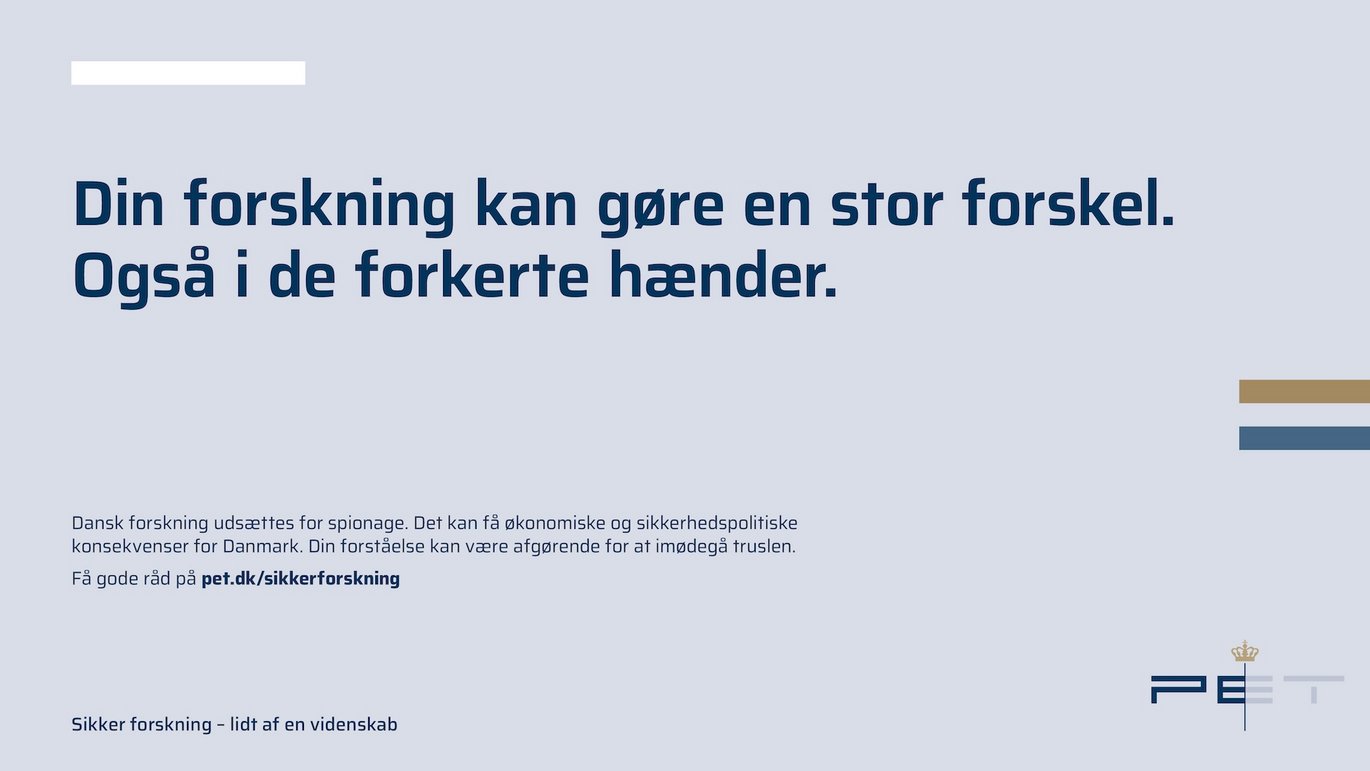The Danish national security agency PET launches campaign for research security
With banner adverts on buses and ironic messages on posters and cups, PET is pushing to make researchers even more aware of the very real threat of espionage from adversary states. According to Brian Vinter, vice-dean for Research at TECH, PET's campaign is a good warm-up for the initiatives that AU will soon start rolling out to safeguard research against misuse, says Brian Vinter.

"Avoid becoming employee of the year in the Russian intelligence service.”
"Your research is a great contribution to national security. Preferably Danish national security.”
There is no shortage of humour, irony and understatement in the Danish Intelligence Service's new information campaign, "Research security - Let’s get it down to a science", which raises the alarm about the increasing foreign spy threat at Danish universities.
Although the messages are delivered with humour, there’s nothing funny about the content. And according to Brian Vinter, vice-dean for research at the Faculty of Technical Sciences and chair of AU’s implementation of guidelines for international research and innovation collaboration, the campaign couldn’t have come at a better time:
“We find ourselves in a security policy situation with a new risk landscape. There are adversary states attempting to intercept knowledge and technology based on Danish research, and what’s complex is that we’re also interested in collaborating with universities and researchers in these countries.”
He hopes that PET's campaign will help researchers navigate the new reality – to begin with, by getting them to think twice and start discussing the campaign’s core message – the importance of keeping data safe, being conscious of security issues when travelling or when hosting researchers from certain countries.
"Humour can be a great catalyst for drawing attention to an important issue,” he said. If PET’s campaign can get our research teams can start an important conversation about research security, then it’s definitely worth it.”
AU to adopt own research security guidelines
He chairs the working group at AU which is responsible for the implementation of guidelines for international research and innovation collaboration. The group is in the process of drafting the guidelines, which will increase focus on security at virtually all stages of research, from hiring colleagues from abroad and using PCs and phones while travelling to procedures connected with the end of an employment contract. To take just a few examples.
"PET's campaign is a foretaste of the initiative AU will roll out over the next two years, which will affect researchers - especially if they collaborate with researchers from Russia, China and Iran. The benefits to science from research collaboration across borders and cultures are indisputable. But the right precautions must be taken to ensure that our research doesn't fall into the wrong hands and get misused. We're already talking about this, and it's going to become much more important in the years to come. Having a laugh about PET's campaign is a fine way to give that conversation a boost," Vinter said.
https://pet.dk/sikkerforskning
Facts
URIS is an abbreviation for ‘Udvalg om retningslinjer for internationalt forsknings- og innovationssamarbejde’, which translates as ‘committee on guidelines for international research and innovation collaboration’. In 2022, the committee published a report detailing its recommendations and guidelines for safeguarding Danish research against financial, security and ethical risks in research and innovation collaborations.
The URIS guidelines will be presented and introduced gradually starting in spring 2024. The first guidelines will cover procedures for hiring researchers from critical countries, among other topics.
In parallel, work is also being done to continuously increase cybersecurity and minimise the risk of data leaks in research more generally.